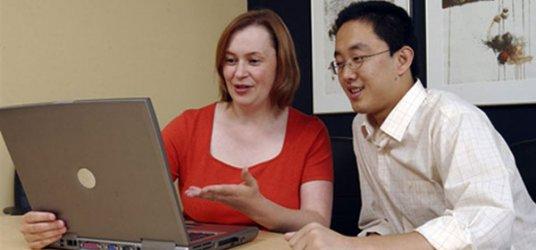
Whether the employer showers the student with praise or addresses specific ongoing problems, a site visit can ultimately improve a student’s work environment. Site visits typically happen in the middle of a work term, which gives Co-op Coordinators the chance to see the student in his or her work environment and discuss performance, thus far, with both the student and supervisor.
Harriet Chicoine, Engineering Science Program Manager, explains, "we don’t always get to see where students are working, unless we go to the site visit, so we get the chance to see what their supervisor is like – because we tend to deal with the HR manager, the supervisor can be a completely different person than who we send the original resumes to. We get to talk to them, we get to see the work environment, we get to see how the student is fitting into the team…so that when we come back to campus, we can give that information to future students who want to apply to that organization and say: ‘This is the type of environment you could be walking into."
Although site visits may appear to be interrupting work flow, they exist to improve the current student’s Co-op experience, and assist future students interested in the same position. There are several ways to make the most of a site visit. First, there are the basic steps that are required from nearly every department. Before your site visit, take some time to:
-
Pull out your Learning Objectives Form and compare your progress to the original objectives
-
Think about what else you've accomplished so far, both in terms of hard and soft skills
-
Note any questions you have about your work term and be prepared to discuss any problems you're having
-
Think about what you might do for a work term project
Preparing for a site visit is an extremely important factor in the Co-operative Education experience. Harriet stresses that the e-mails and "temperature check" forms should be taken seriously: "This is our opportunity to listen to you – find out what’s going on in your head, how you want to develop…its career development." The site visit is an opportunity to reflect and record your learning on an ongoing basis, instead of waiting until the very end of the work term, when you may not remember something you learned way back at the very beginning of the semester.
Secondly, along with the importance of completing the temperature check form (or any mid-semester forms provided by your Co-op program), former Communication Co-op Coordinator Erica Wah stresses the importance of being prepared logistically. She advises students to "book a room. I have spent half of my site visit time tracing hallways looking for a quiet place to meet with a student because they didn’t read the part of the e-mail that says please book a room." Organizing a meeting is a basic skill that everyone should have when at University and upon entering the work world. When everything is prepared and in order, not only will people be impressed but the student will appear well prepared.
Communication Co-op Coordinator Marcia Shimizu gives an example of what a good site visit might entail: "'successful' means leaving and having the sense that you have helped the student map out the next steps they have to take. Maybe there’s a problem to resolve, maybe things are going really well, what are they going to do for their next Co-op work term…so, it’s just having a really good discussion about the student's learning, what they’re doing, and what their future plans are." If something work-related needs to be resolved or improved, students should be honest with their Coordinator about it so they can help to faciliate the resolution.
Site visits are the opportunity for students to express themselves and provide feedback regarding their position. Particularly, for the students who find it difficult to share problems or complaints, Coordinators are there to meet with them in a safe, comfortable environment and discuss any concerns. Take a bit of time to prepare to get the most out of your site visit and it will pay off when you get to the end of your work term and find that you've accomplished what you set out to do!
Beyond the Blog
-
Curious about co-op? Visit the Co-operative Education homepage to learn more!














